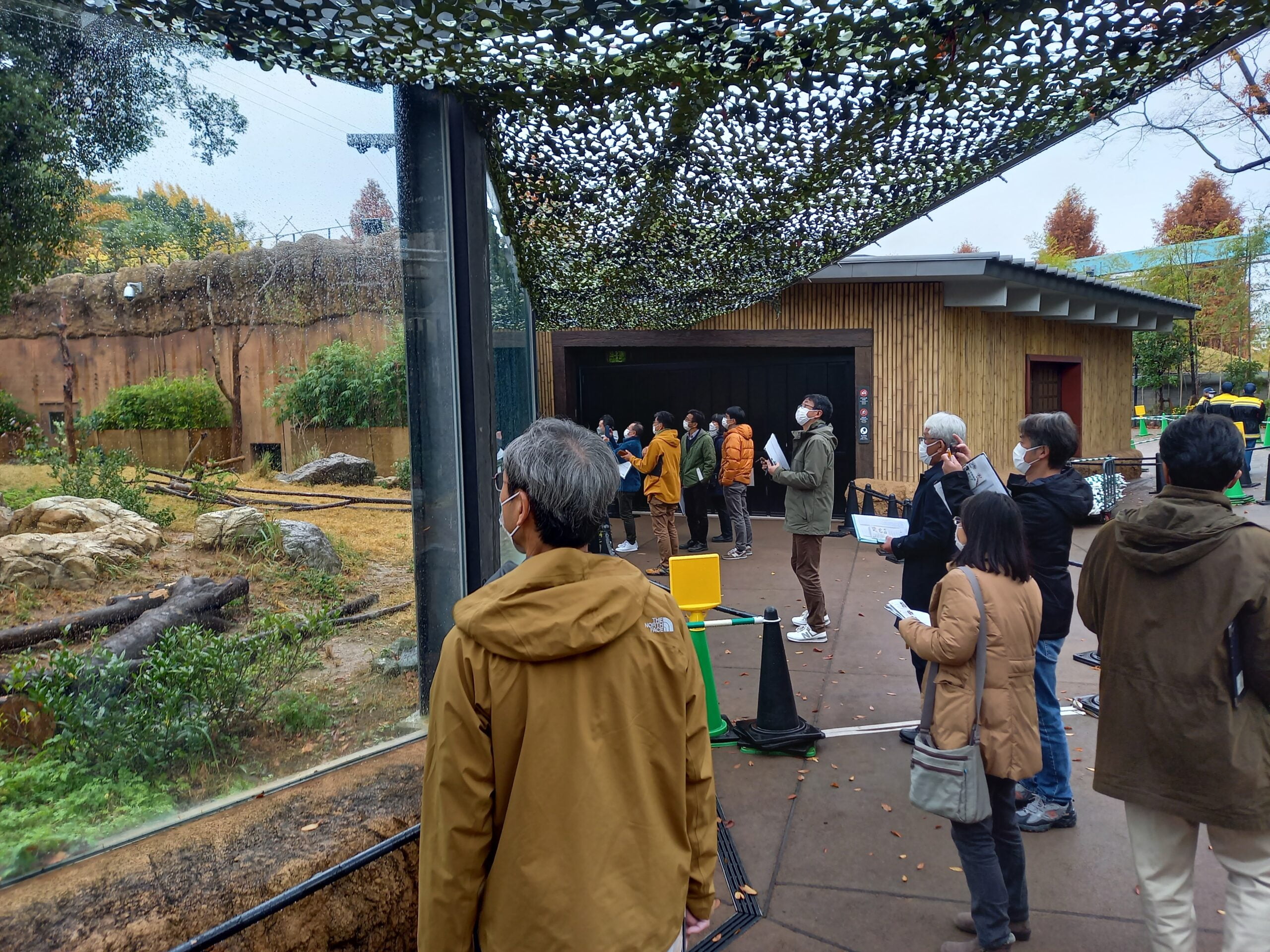Wild Welfare Trains JAZA Members in Welfare Auditing
In December, Wild Welfare’s Founder and Field Director, Dave Morgan, and Director, Simon Marsh, trained nearly 50 members of the Japanese Association of Zoos and Aquariums (JAZA) to carry out animal welfare audits in captive wildlife facilities.
*Scroll down to read in Japanese | 日本語は下にスクロールしてください*
Dave and Simon delivered two separate training workshops to make the training more accessible to JAZA members from all across Japan. Members of the JAZA Animal Welfare and Ethics Committee and executive office staff also attended.
Hosted first by Ueno Zoo, Tokyo, and then by Kyoto City Zoo, Kyoto, each training workshop took place over the course of two days.
The training was made up of both practical and theory-based sessions. On the first day, participants were introduced to animal welfare concepts and completed classroom-based exercises. This included how to conduct effective welfare audits in line with the JAZA Animal Welfare Standards which was developed with the assistance of Wild Welfare over the course of 2022.
Wild Welfare’s Director, Simon Marsh, said, “We are very honoured to be working with JAZA in assisting them to develop their own animal welfare standards.
At Wild Welfare we always work in collaboration and we are focused on capacity building with each country or region we work in. By building the skills and resources within Japan we can ensure long-term improvements to how animals are cared for and that their welfare is a priority.”
Welfare audits are a comprehensive way to assess gaps and opportunities for improved animal welfare within individual facilities.
The second day of the training saw participants split into small groups to conduct their own mock welfare audit of the respective host facility (either Ueno Zoo or Kyoto City Zoo).
This included inspection of veterinary facilities, food preparation areas, animal nutrition, and the facility’s record keeping. The groups also took into account the environment and behaviours of individual animals within the facility.
Hirofumi Watabe, Chair of the JAZA Ethics and Welfare Committee and Director of Tama Zoological Park in Tokyo, said, “Wild Welfare’s instructors have exceptional knowledge, skills and experience in captive animal welfare. The opportunity to meet face to face and share experiences made this course extremely beneficial for JAZA auditor candidates. These efforts have accelerated JAZA’s commitment to animal welfare.”
Training animal care staff to carry out their own welfare audits increases the reach of guidance on how to improve animal welfare. This allows more gaps in animal welfare to be identified, and therefore more opportunities for improvements.
For example, the performance of welfare audits can identify the need to provide species-appropriate apparatus or substrate in an enclosure. We know that increasing the provision of good environmental enrichment gives captive wild animals the opportunity to play, forage, investigate and interact with a more stimulating and comfortable environment, which is proven to improve their welfare.
Dave Morgan, Founder and Field Director of Wild Welfare, said, “When we train auditors we are teaching them to check that the primary animal care of a facility is compliant with the Association’s Standard for Welfare.
By training JAZA members to conduct effective audits against their Association’s Standard, they can systematically assess the welfare provision across a facility, identify non-compliances with the Standard and require – under the articles of the Association – such non-compliances to be addressed. Thus, animal welfare is improved for thousands of animals over time.”
In the year leading up to the training, Wild Welfare was working with JAZA member facilities to develop their own Animal Welfare Standard and accreditation system. Based on Japanese legislation, Wild Welfare and JAZA worked together to achieve a robust process for accreditation.
Participants of the training sessions learned how to apply the new Welfare Standard when carrying out mock welfare audits of the host facilities. They also learned how to ask critical questions and interpret whether the Standard is being met. Lastly, they were trained on how to describe the necessary corrective actions to be undertaken to bring the facility up to compliance with the Standard, when reporting back to the facility.
There are now approximately 140 JAZA member facilities across Japan. Wild Welfare has been working with JAZA on animal welfare concepts – with a particular focus on welfare auditing – for many years.
Wild Welfare has a proven track record of delivering training to individual facilities, associations and NGOs which results in better welfare standards for the animals. We use bespoke training materials and resources, like our Core Fundamental Standard of Practice for Captive Wild Animals, to facilitate the changes needed to allow animals in captivity the opportunity to thrive, and not just survive.
JAZA has the potential to improve animal welfare in Japan significantly, and we’re delighted to support them with our training workshops and other resources.
~ENDS~
Notes to Editors
For more information or interview requests please contact Wild Welfare on communications@wildwelfare.org
Wild Welfare is a global organisation committed to improving animal welfare for captive wild animals. By uniting the world’s leading zoos, zoo associations and animal welfare organisations, we build trusting partnerships that help provide long-term solutions to critical wild animal welfare issues.
Our vision is to end the suffering of captive wild animals around the world and ensure full and sustainable protection is given to all animals in human care. Find out more at wildwelfare.org. Registered charity in England (no.1165941).
12月、Wild Welfareの創設者でフィールドディレクターのDave MorganとディレクターのSimon Marshは、日本動物園水族館協会(JAZA)の約50人の会員に、野生動物飼育施設での動物福祉評価を実施するためのトレーニングを行いました。
DaveとSimonは、日本全国から集まったJAZA会員がより参加しやすいように、2回に分けてトレーニングとワークショップを行いました。JAZAの動物福祉・倫理委員会(Animal Welfare and Ethics Committee)のメンバーや事務スタッフも参加しました。
まず東京都恩賜上野動物園、次に京都市動物園が主催し、二日間の日程でトレーニングとワークショップが行われました。
トレーニングは、実践と理論のセッションで構成されています。初日、参加者は動物福祉の概念についての講義を受け、座学による演習をこなしました。これには、2022年にWild Welfareの支援を受けて作成された「JAZA動物福祉基準」に沿った効果的な福祉評価の実施方法が含まれています。
Wild WelfareのディレクターであるSimon Marshは、「JAZAが独自の動物福祉基準を策定することを支援し協力できることを大変光栄に思います。
Wild Welfareでは、常に協業を行い、それぞれの国や地域で能力開発を行うことに注力しています。日本国内においてスキルとリソースが構築されることで、動物のケア方法を継続的に改善し、動物福祉が優先されるようになります」と述べています。
動物福祉評価は、個々の施設における動物福祉の改善を阻害する要因と、改善の機会を網羅的に評価する方法です。
トレーニング2日目は、参加者が小グループに分かれ、それぞれの施設(上野動物園または京都市動物園)で模擬福祉評価を実施しました。
この視察では、獣医施設、食餌仕込みエリア、動物の栄養状態、施設の記録管理などを確認しました。また、グループは施設内の環境と個々の動物の行動も考慮しました。
JAZA倫理・福祉委員会委員長(Ethics and Welfare Committee)で東京都多摩動物公園の園長 渡部浩文氏は、「Wild Welfareの講師陣は、飼育動物福祉に関する卓越した知識、技術、経験を持っています。直接会って経験を共有できるこのコースは、JAZA評価員候補者にとって非常に有益なものとなりました。こうした取り組みにより、JAZAの動物福祉へのコミットメントが加速されました」と述べています。
動物ケアスタッフが自ら動物福祉の評価を行えるようにトレーニングすることで、動物福祉を改善させるためのガイダンスの普及が進みます。これにより、動物福祉におけるより多くの阻害要因が特定され、改善の機会が増えます。
例えば、福祉評価の実施により、囲いの中に種に適した器具や床材など提供する必要性を特定することができます。私たちは、良好な環境エンリッチメントの提供を増やすことで、飼育下の野生動物がより刺激的で快適な環境で遊び、索餌し、探索し、交流する機会が得られ、これらにより彼らの福祉を向上させることが証明されています。
Wild Welfareの創設者でフィールドディレクターのDave Morganは、「評価員を養成する際、施設の主要な動物のケアが、協会の福祉基準に適合していることを確認するよう指導しています。
JAZA会員が協会の基準に対して効果的な評価を実施できるようにトレーニングすることで、施設全体の福祉規定を体系的に評価し、基準への不適合を特定し、協会の基準に基づいて、その不適合に対処するよう要求することができます。こうして、何千頭もの動物たちの動物福祉が継続的に改善されるのです」と述べています。
トレーニングに至るまでの1年間、Wild WelfareはJAZA加盟園館と協力し、独自の動物福祉基準と認定システムを開発しました。日本の法律に基づき、Wild WelfareとJAZAは協力して、認定に向けた強固なプロセスを実現しました。
トレーニングセッション参加者は、主催施設の模擬福祉評価を行う際に、新たな福祉基準をどのように適用するかを学びました。また、新たな福祉基準が満たされているかどうかを判断するための重要な質問の仕方も学びました。最後に、施設に報告する際に、施設を基準に適合させるために必要な是正措置を説明する方法についてのトレーニングを受けました。
現在、全国に約140のJAZA加盟園館があります。Wild Welfareは、JAZAと長年にわたって協力関係にあり、動物福祉の概念、特に福祉評価に重点を置いています。
Wild Welfareは、個々の施設、協会、NGOにトレーニングを提供し、その結果、動物の福祉基準を向上させたという実績があります。私たちは、「飼育野生動物のためのコア基本実施規定」のような特化したトレーニング教材やリソースを使用して、飼育下の動物たちが生き残るだけでなく、繁栄する機会を得るために必要な変化を促進しています。
JAZAは日本の動物福祉を大きく改善させる可能性を秘めており、私たちはトレーニング・ワークショップ、その他リソースを通じて、JAZAを支援できることを嬉しく思っています。





















